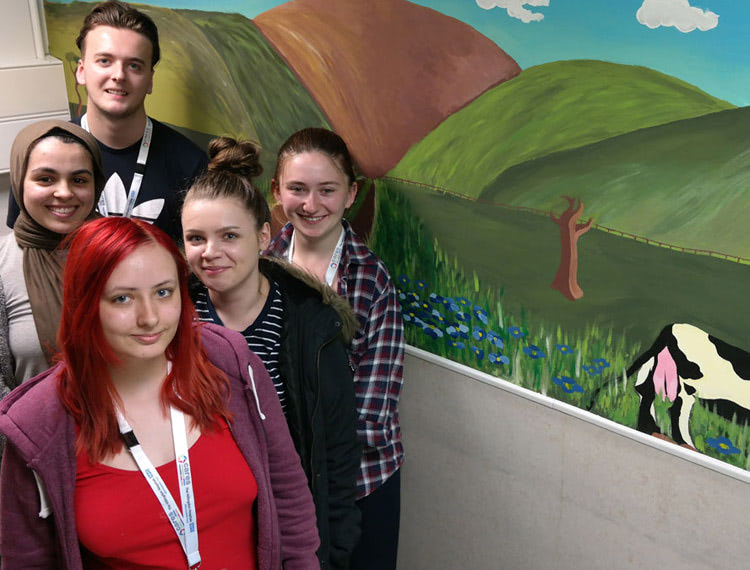Murals by Uxbridge College students calm dementia patients at Hillingdon Hospital

Artistic Uxbridge College students have created two beautiful murals in an A&E cubicle for patients with dementia.
The art has been designed to be calming and reassuring to patients who may be confused and therefore difficult to treat.
The two scenes – a countryside scene complete with the forget-me-not flowers used as a symbol of support for dementia awareness, and a seascape – were created by eight first year students on the Level 3 course in Art and Design.
The eight students developed designs based on the hospital’s brief to create calming, relaxing and reassuring images, including creating mock-ups which were then scaled up to the size of the walls. They also sourced materials and suppliers and calculated costings for everything from paint and brushes to masking tape and overalls.
Clara Clark, Art and Design Lecturer, said: “This has been a very valuable experience for our students about how art can be used to transform environments for the good of other people.
“They have gained many important professional skills from working on this and it has been a great opportunity and really interesting working with Hillingdon Hospital.”
Kim Pendergast, Senior Sister in the A&E Department, said: “We are so grateful to the Uxbridge College students for creating these gorgeous murals, which really enhance the dementia-friendly area of our Emergency Department.
“Beautiful, pastoral scenes like this have a calming effect on patients with dementia, so this generous donation of time and talent is so appreciated.”
One of the team of students, Yaminah Arbibey, 18, said: “This was a great experience, especially putting in images of forget-me-nots, which are symbolic of dementia awareness and bring a little bit of the British countryside into A&E.”
The work complements other dementia-friendly items in the A&E department at Hillingdon Hospital including its mock-up ‘bus stop’, which includes a bus sign mounted on a wall indoors, seats and timetable. The idea, originally from Germany, is based on studies showing that dementia patients often feel they want to get home when they are somewhere unfamiliar, and find ‘bus stops’ such as these calming.











Responses